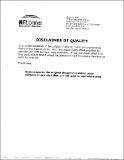Beta 3 integrins : negative regulators of angiogenesis
Author(s)
Lively, Julie C. (Julie Christina), 1971-
DownloadFull printable version (17.41Mb)
Alternative title
β3 integrins : negative regulators of angiogenesis
Other Contributors
Massachusetts Institute of Technology. Dept. of Biology.
Advisor
Richard O. Hynes.
Terms of use
Metadata
Show full item recordAbstract
A method was developed to isolate and purify primary murine endothelial cells from lung tissue (MLEC). The cells generated by this method were characterized by immuno-fluorescence detection and FACS analysis and expressed specific antigens including PECAM-1, ICAM-1, ICAM-2, VCAM-1 and VE-cadherin. Using this method, cells from wild-type and beta 3-integrin-deficient animals were purified and used to determine the specificity of a novel potential anti-angiogenic drug. This study shows that tumstatin, a fragment of the alpha 3 chain of collagen IV, inhibits proliferation, inhibits total protein synthesis and specifically inhibits CAP-dependent protein synthesis in MLEC. These effects do not occur when beta 3-null MLEC are treated with tumstatin or any of its derivatives. Nor do they occur in mouse embryonic fibroblasts which do express beta 3 integrin. The inhibition by tumstatin also occurs in in vivo angiogenesis assayed using a Matrigel plug insert. Similarly to in vitro assays, tumstatin failed to inhibit angiogenesis in beta 3 integrin-deficient animals. These results suggest that avf33 integrin is necessary but not sufficient for the activity of tumstatin. Further studies are required to identify avf33 integrin-associated factors in endothelial cells which determine tumstatin's endothelial cell specificity. Matrigel plug assays were also used to demonstrate that the loss of beta-3 integrin enhanced VEGF-induced angiogenesis. Results also show that VEGF-induced angiogenesis was enhanced in aortic ring explants from beta 3-null animals. These data suggest a new role for beta 3 integrin as a negative regulator of angiogenesis, both as a receptor for an endogenous inhibitory molecule and as an inhibitor of VEGF-induced angiogenesis.
Description
Thesis (Ph.D.)--Massachusetts Institute of Technology, Dept. of Biology, 2002. Includes bibliographical references (leaves 199-219).
Date issued
2002Department
Massachusetts Institute of Technology. Department of BiologyPublisher
Massachusetts Institute of Technology
Keywords
Biology.